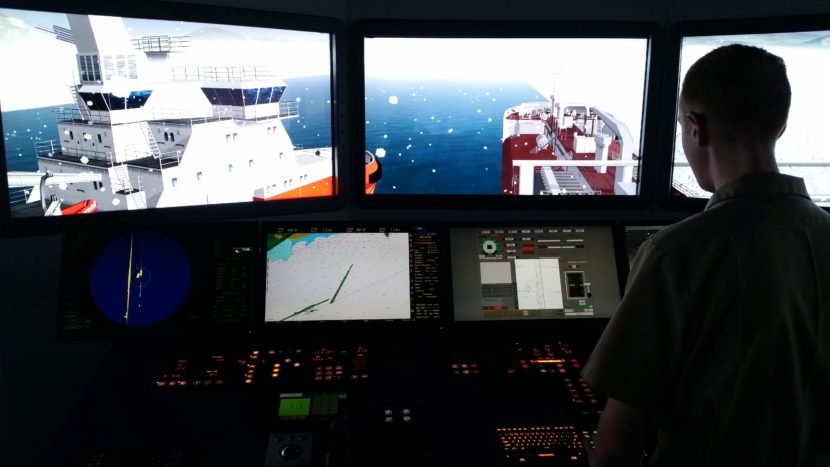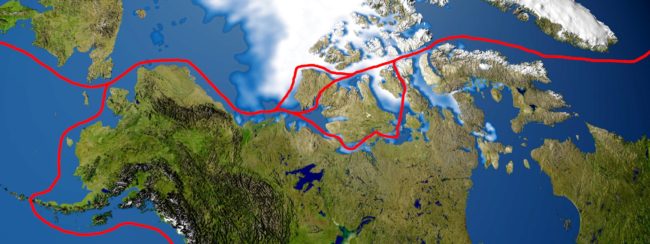
In a windowless room at Maine Maritime Academy, Glenn Burleigh is standing calmly at the controls of a massive tanker. He is stuck, encased in a sea of ice, waiting for an icebreaker to break him free.
When help arrives, the rescue doesn’t go as planned.
“I think this is one of the situations where things do go wrong,” Burleigh said. “I seem to have lost my rudder.”
Burleigh is one of nearly 1,000 students studying at Maine Maritime Academy. He hopes to one day captain a ship. Today is a preview of what that job might look like in the Arctic Ocean.
The software is so detailed; you can hear the birds circling overhead. Just like a real ship. But without the danger.
“I mean you can ask the people who ran the Titanic what the risks are associated with ice transit and you would have a pretty good understanding what that’s all about,” Capt. Ralph Pundt said.
Pundt designed this polar navigation course with help from a Department of Homeland Security grant.
Before teaching, Pundt served as a merchant marine captain and spent time working at both poles. His time sailing taught him how much he didn’t know. That lack of knowledge was dangerous.
He said practicing in the simulator is a chance for real world experience, kind of.
“There’s nothing like the real thing,” Pundt laughed. “It’s as close as you can get without being in the real thing. The nice thing is that stop-gap between basic book learning and having the responsibility of a multi-billion-dollar vessel. If they make mistakes, let them make the mistakes here.”

This class isn’t the only way to learn Arctic navigation. Pundt’s working on a more advanced version and AVTEC, the technical college in Seward, has one, too. These classes will get mariners up to speed for the Polar Code, which goes into effect in January. The international code requires additional training for mariners to protect ships, passengers, and crews operating in the harsh Arctic and Antarctic environments.
Pundt said the Arctic Ocean today is a dramatically different place than when he was there 30 years ago.
“We could not go through most of the ice up there without an icebreaker escort at that time,” Pundt said. “I talk to my students who transit up there and I say, ‘How is the ice this year?’ They say to me, ‘What ice?’ It’s that open now.”
With less ice, Pundt said there’s a new set of risks. Mariners have to know what they’re up against.
That’s what’s great about practicing in the simulator. With the click of a mouse, almost any situation becomes reality.
“From here I can control weather,” Pundt said. “I can make things very nasty, very quickly here. How about some blowing snow? That’s Alaska weather right?”
That’s part of why Burleigh signed up for Pundt’s class. With Arctic ice decreasing, more ships will transit the Northwest Passage. That could mean a growing job market, which Burleigh has his eyes on.
“When that industry does open up more, I can walk in and say I’m already certified for this. You don’t have to send me back to school for it,” Burleigh said. “I’m ready to go right now. I’ve had experience doing simulations with ice and whatnot, so that puts me ahead of a normal third mate who hasn’t done anything with this.”
Right now, the market is small and it’s unclear what the future holds for icebreakers. This summer, the cruise ship Crystal Serenity made a historic transit of the Northwest Passage with a personal icebreaker escort.
Back on the bridge, success. Both ships have broken through the ice.
Burleigh completed the course earlier this year and is one step closer to a future as an Arctic mariner. But his teacher, Pundt, questions if those jobs should even exist.
“I’m not a fan of all this happening in the Arctic or in the Antarctic,” Pundt said. “I think it needs to remain pristine. If we do have to go up into the Arctic, we need to understand it and respect it for what it is.”
With the class, Pundt wants to cultivate a new crop of mariners trained to navigate polar waters with minimal impact, even if he’s hoping they don’t have to go there at all.
Zoe Sobel is a reporter with Alaska's Energy Desk based in Unalaska. As a high schooler in Portland, Maine, Zoë Sobel got her first taste of public radio at NPR’s easternmost station. From there, she moved to Boston where she studied at Wellesley College and worked at WBUR, covering sports for Only A Game and the trial of convicted Boston Marathon bomber Dzhokhar Tsarnaev.




